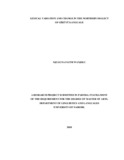| dc.description.abstract | The purpose of this study was to investigate lexical variation and change in the
Northern dialect of Gikuyu language. The study was guided by three objectives
which sought to: identify the types of lexical variation and change in the Northern
dialect of the Gĩkũyũ language; establish the factors responsible for lexical
variation and change in the Northern dialect of Gĩkũyũ language and lastly to
investigate the consequences of lexical variation and change in the Northern
dialect of Gĩkũyũ language. The study was guided by the variationist theory
proposed by Labov (1972). The target population consisted of all the speakers of
the Northern dialect of Gĩkũyũ language living in Northern Murang’a in
Murang’a County. The study used non probability sampling in the selection of the
sample. A sample of 40 respondents who comprised of 20 respondents aged
between 15 and 25 years and 20 respondents who were aged 65 years and above
was selected. The study was carried out using descriptive survey research design.
Data was collected using interviews. There were two sets of interviews for the
two categories of respondents. Data analysis was done in line with the variationist
theoretical framework. In data analysis, words in the data were transcribed
orthographically and phonetically and thereafter presented in tables where
patterns were observed. Findings revealed that there were several types of lexical
variation in Northern dialect of Gĩkũyũ language. The types included
geographical variation, social variation, contextual variation, onomasiological
variation and semasiological variation. Findings also revealed that various factors
were responsible for the variation and change in the Northern dialect of Gĩkũyũ
language. These factors included word loss, borrowing, loan translations, and
modernization and schooling. Findings on the consequences of lexical variation
and change in this dialect revealed that the variation and change had resulted to
communication breakdown between the old and the young speakers of the dialect.
The lexical variation and change had also resulted to change in the syllable
structure of words, replacement of one word with a phrase, vocabulary expansion
and lastly extinction of lexical items. | en_US |

